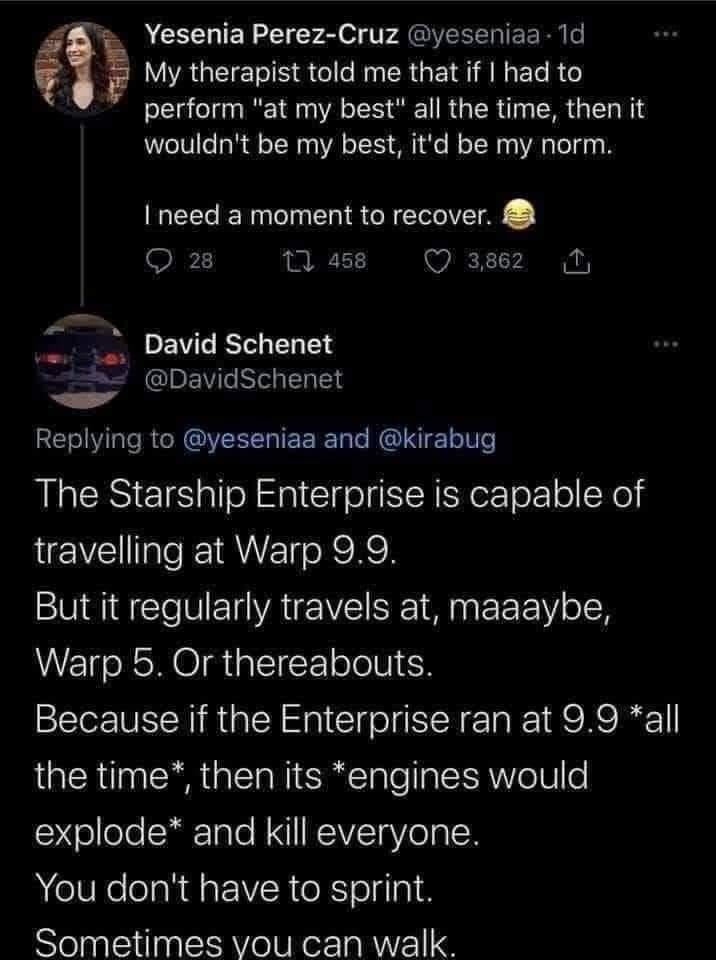In a similar vein, when you drive anywhere in your vehicle you don't keep your engine at the red line at all times. You would wear it out within 20,000 miles at best. In fact, the engine almost always tries to be at the lowest rpm feasible.
We should strive to be like our vehicles: operating at the lowest load possible, hustling only when necessary.
Microblog Memes
A place to share screenshots of Microblog posts, whether from Mastodon, tumblr, ~~Twitter~~ X, KBin, Threads or elsewhere.
Created as an evolution of White People Twitter and other tweet-capture subreddits.
Rules:
- Please put at least one word relevant to the post in the post title.
- Be nice.
- No advertising, brand promotion or guerilla marketing.
- Posters are encouraged to link to the toot or tweet etc in the description of posts.
Related communities:
Right. That speedometer goes all the way to 270 km/h but on average we drive at about 30km/h in a city. That's why our cars can last 400000 km while a Formula 1's engine last about one race.
Your analogy is a lot worse than the one from the guy you replied to. Formula1 engines last multiple races since each car is only allowed 3 engines per season. And the reason they last so short is cause they are running at insane amounts of compression and rpm, not because of the speed the cars are driving.
A Formula 1 car doing 30kmh in stop and go city traffic would break down after a lot shorter distance than a road going sports car doing a constant 300kmh on the Autobahn
The other reason for traveling at Warp 5 is that the Enterprise is an explorer ship. If you never slow down you'll "make good time" but miss the Universe's Biggest Ball of String. Working at 100% can make you miss nuances that could be important, or could just add some ineffable element to your inner life.
There's also that one episode where it comes out that fast warp travel damages the universe and they need to be slower than a certain warp to not damage it. But in good old TNG fashion this is never referenced again in the future.
They don’t directly mention it, but as I recall after that episode traveling at high warp speeds was greatly diminished and warp speeds above certain thresholds were only used in emergency situations/required special authorization. So not completely abandoned but they certainly didn’t build on the premise, which is a shame because I thought it was one of the cooler plot elements that was introduced in the series.
And I think that was the excuse for Voyager's flappy wings, but that might be fanon.
As I recall it was vaguely mentioned (in a different series) that newer warp engines didn't cause the same damage at high warp speeds.
Also because of that one episode that put a standard limit on warp travel, the entire warp scale got rejiggered at some point. Where warp 10 became the upper limit.
There are episodes where ships are noted to have been travelling at warp 13 or 14 before they reworked warp speeds
Warp 5? That's really slow.
I'd say their common travel speed is more like warp 7.
Guess it's time for another entire rewatch of TNG to check the stats.
Warp 8 was the most common warp factor used for general travel on TNG. Warp 9.2 was actually the maximum sustainable cruising speed of a Galaxy class ship. This was played for a laugh in Menage a Troi when Picard called for Warp 9 when returning Lwaxana to Betazed at the end of the episode.
Near the end of the series didn't they set a speed limit of warp 7?
In Force of Nature (S07E09) they discover that high speed warp travel can damage the fabric of space and a speed limit of warp 5 is set by the Federation for non-emergency travel. It gets referenced a couple of times in the final season of TNG but doesn't come up much after.
Though arguably Voyager's situation and the Dominion War could both be reasonably considered "emergencies". It's also been suggested that the Federation was very quick to develop warp drives that didn't cause this damage (this is one official but never-published explanation given for the Intrepid Class variable geometry warp nacelles).
This is also why I can't respond 'good' to how I am. If I am 'good' then it means I'm better than average or median. But if I say I am good too often, it becomes the average.
I'm the only person I know who thinks it's incredibly rude to ask people how they are as a greeting when you don't really want an honest answer. It puts the person being asked on the spot to be disingenuous like everyone expects, or offer information that the greeter really didn't want, and therefore shouldn't have asked for in the first place.
This is how I feel about it as well, but as an autist, I've learned that neurotypical just mean it as a greeting, and nothing more. It doesn't matter what you say, they just want a "hello" in a structured way.
My husband always says he's normal when asked. It took some time to get used to not hearing "good". Our toddler now also replies with she's normal.
Teaching the youngling how to voice emotions and sometimes you just need a society break will set that kid up far better than the usual education systems we have.
I consider "good" to be of the binary group good or not good.
Average is good, a little low is good. Great is good
Though I usually answer "fine :)"
Massive push to get everyone into therapy because literal face-to-face human interaction can't be automated, but by gosh it can surely be commodified.
Everything has value. The question is should everything have a monetary value?
And sometime you might need to crawl. And sometime you might need someone to carry you.
Makes me wonder why they didn't make the ship strong enough that it was capable of sustaining 9.9. Also: they've broken the warp barrier like 2 or 3 times and the ship was fine. 🤷🏻♂️
they've broken the warp barrier like 2 or 3 times and the ship was fine
The ship, sure. Some crew members, however...

Presumably if they made a ship strong enough to sustain warp 9.9, it'd have a higher theoretical max speed along with it.
I am still watching through TNG for the first time, but the only instances I really recall it exceeding those numbers are when they had Dr. Kosinski and his traveler "assistant" performing a warp drive experiment which lasted a very brief time and yielded basically unproduceable results, and a couple instances of the ship being catapulted at impossible speeds by Q. The structure of the ship was fine in each instance, but the engine would have likely exploded if they tried to push it to those levels under normal circumstances.
There's one where Barclay turns himself into a supercomputer and breaks the theoretical limits. But, IIRC, it's in one of the last couple seasons.
That was a cool episode. I always get it mixed up in my mind with the episode where The Traveler spins them off into some nether realm and Crusher has to help get them back.
Makes me wonder why they didn’t make the ship strong enough that it was capable of sustaining 9.9.
They did; it's called USS Voyager. Its maximum sustained speed was warp 9.975.
It's not super obvious on-screen, but the Intrepid-class was considerably faster than even the Sovereign-class (Enterprise-E), let alone the older Galaxy-class (Enterprise-D).
It was also significantly less massive. And like 50% if of it was dedicated to the warp system.
Think of a better ship to strand on the other side of the galaxy than the fastest conventional warp capable ship.
Think of a better ship to strand on the other side of the galaxy than the fastest conventional warp capable ship.
That Borg ship that can generate its own wormholes.
Voyager at least had the excuse of "we might run outta gas."
because if it could constantly do 9.9 then it's max speed would probably be higher
For any vessel/vehicle, travelling at maximum speed is not only unsafe, but it is also very inefficient on fuel and induces an exorbitant amount of stress on the engine, transmission, and propulsion system, requiring much more frequent and intensive maintenance.
Very few vehicles routinely exceed 80% of their maximum speed. And even then, only when the coast is clear and it’s safe to let the throttle out.
But isn't strange reptile sex stuff happening at those speeds? What's the analogy?
That happens when you break the Warp 10 threshold (in normal space, doesn't happen if you're in a transwarp corridor).
Well, the ship analogy doesn't really hold up. If we draw a parallel with existing maritime ships, they can sustain their rated top speed when necessary. However, this is rarely done primarily due to fuel efficiency. Since there are diminishing returns to pushing speed, it’s only done under serious time constraints.
"the ship analogy doesn't really hold up ... if you consider the ships to be a completely unrelated kind of ships ... except here's how it would still hold up anyway"
Then it's literally the same. We can maintain our max for sustained periods too, but it burns more fuel, we require more maintenance, and eventually we break down.
Ships have a max speed due to drag from water and other complicated physics stuff involving hydrodynamics.
Modern ships are far more maneuverable and able to reach their top speed faster than they used to, even when carrying more mass. That is because their engines are more powerful and we maxed out 'enough for top speed for naval vessels' a long time ago.
I know why ships have max speed, I have a bachelor's degree in maritime navigation.
But also, I honestly don't see how this comment is relevant to the subject. Yes, modern ships are faster than older ships. But they still usually run at half speed or less.
To be super technical about the argument (sorry): Your initial comment is irrelevant to the subject since the post talks about (fictional) starships to which very different (and handwavy) physics apply.
Im still glad to have learned a tiny bit about real world ships though. Thanks.
How many parsecs is that?
